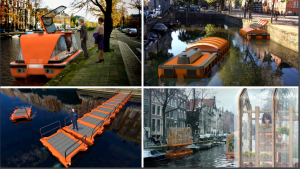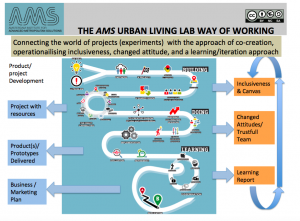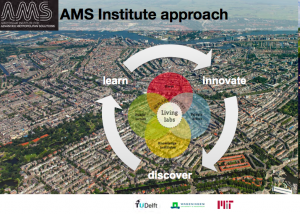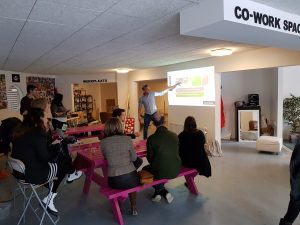Blog by 4TU.CEE programme coordinators Renate Klaassen (TUD) and Chris Rouwenhorst (UT)
On the 24th of January 2019, 4TU.Centre for Engineering had the privilege to visit the Amsterdam Metropolitan Institute. 30 participants from the 4 Technical Universities in the Netherlands participated in this first stop of the 4TU learning spaces tour. The programme consisted of two site visits to two living labs HOOD and DIGITAL where students of the master Metropolitan Analysis, Design and Engineering (MSc MADE) in action contexts and stakeholders were interviewed on their experiences and the pedagogical framework in which they were working. Back at the institute we enjoyed a lovely lunch while networking with other 4TU partners interested in this topic.
About AMS
After lunch we had institutional presentations on the what and how of the Amsterdam institute by Kenneth Heijns (institutional director) and the living lab learning cycle, by Leendert Verhoef (programme lead living labs).
The AMS institute was officially launched in June 2014 and is therefore a very young institute. The institute was founded as a collaboration with the municipality of Amsterdam, Wageningen University, Delft University of Technology and M.I.T.
The municipality is the main client requesting urban and sustainable solutions for the metropolitan area. The solutions range from sustainable festival lighting, to participatory area development, to sustainable ro-boats for garbage logistics, green food transport, to flexible open space for social events.

Innovation eco-system
The strong integration of science, education, government, business partners and social organisations to create transdisciplinary and sustainable solutions for complex challenge in the metropole of Amsterdam spurs the rapid development of an innovation eco-system. The innovation eco-system develops as the municipality of Amsterdam, in close cooperation with the AMS institute, strives to bridge gaps between private industrial labs, scientific research labs, urban test sites with living labs to serve public interests.


Lessons learned
The afternoon closed off with midterm presentations of students in living labs, who work on defining and understanding the metropolitan challenges that Amsterdam is facing today. Interesting were the lessons learned by students operating in a living lab.
Positive experiences were that the knowledge development is open for replication. There is an increase in urban sustainability solutions with surprising applications of innovative solutions not thought of before. The population became more aware of circularity as a sustainable solution. Co-creation and diverse stakeholders involvement stimulated the development of innovation, new ways of working, team & building and networking opportunities.
Challenges
Despite these very positive learning outcomes a few challenges were also named. Such as having to explain what a living lab is time and again. Following the living lab methodology and not doing a sort of project or design project. Finding and documenting the right data was not easy either. Linked to that is testing and evaluating the living labs results, which is not happening right now, how are we going to get it off the ground? Co- decisions making, keeping all parties involved and having the decision power in the appropriate hands are further challenges. The bureaucracy of larger (non)-governmental institutions are further challenges to meet deadlines and deal with many iterations with stakeholders to realise the living lab objectives.
Other questions are amongst many:
- How to deal with the techno vs socio – cultural fix
- How can local citizens be involved in technological developments in the early stage?
- Is co-creation or the living lab approach useful for the development of technological niche?
For the coordinators of the 4TU it was a very inspirational day. It was impressive to see how many connections and relations to other institutes and the municipality have been created in the first 4 years of existence of the AMS institute.
HOODlab examples
The set-up of the AMS institute and living lab way of working addresses many challenges for future academic education. Three examples from the Amsterdam HOODlab:
First the living labs are bridging the gap from a university study to society and a working life after the study. It really helps to bring theory into an applicable practice. Such as the bulk waste problem in the Amsterdam neighborhood, that is tackled at the HOODlab. Students are working on a real authentic problem.
Secondly the students need to use a lot of skills in order to complete the project in the living lab. In a living lab location you are required to communicate with diverse groups of people, people living in the neighborhood, the municipality etc. Students also need project management skills, work autonomously and need to be flexible in order to finish the project.
Thirdly students are challenged to bridge disciplines in order to find a solution. Solutions that are high tech, but incorporate societal factors at the same time.
Academic setting
 In many academic interdisciplinary projects across our universities, the assessment of the integrative interdisciplinary solutions are an issue. The concern is both about the relevance of the integration and the level of “mono”- disciplinary knowledge which is embedded and demonstrated in the final results. The “living lab” in the MADE master is even more complex than most of these interdisciplinary university courses, involving many more stakeholders, disciplines and the necessity to come to an applicable result in practice. Although the primary focus in the assessment is on the process application of the living labs, the results do matter for the companies involved in the living lab course. The assessment in itself is equally more complex. The traditional assessment tools available may not be apt for obtaining insight in the levels of learning that have actually taken place. It would be of interest to find out how in the MADE master this assessment is tackled and what we can learn from this in 4TU contexts in terms of maintaining the academic level in complex situations and the way in which we can fairly and transparently assess the process and results.
In many academic interdisciplinary projects across our universities, the assessment of the integrative interdisciplinary solutions are an issue. The concern is both about the relevance of the integration and the level of “mono”- disciplinary knowledge which is embedded and demonstrated in the final results. The “living lab” in the MADE master is even more complex than most of these interdisciplinary university courses, involving many more stakeholders, disciplines and the necessity to come to an applicable result in practice. Although the primary focus in the assessment is on the process application of the living labs, the results do matter for the companies involved in the living lab course. The assessment in itself is equally more complex. The traditional assessment tools available may not be apt for obtaining insight in the levels of learning that have actually taken place. It would be of interest to find out how in the MADE master this assessment is tackled and what we can learn from this in 4TU contexts in terms of maintaining the academic level in complex situations and the way in which we can fairly and transparently assess the process and results.
Overall we had a very positive first visit. The presentations of this day and Living Labs report can be found here:
– AMS presentation
– MADE presentation
– Living Labs presentation
– Living Lab Way of Work report
We thank the AMS institute for their hospitality and are really looking forward to our next stop in the Learning spaces Tour at Wageningen University on 12 March 2019. 4TU staff is invited to join. Read more and register here.




